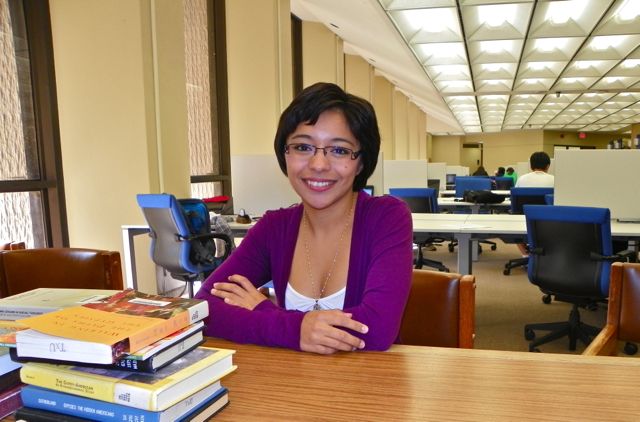Dreaming of a Better Future Through Deferred Action

University of Texas junior Nayeli Perez, 20, is an undocumented resident. She has applied for a two-year work permit under President Obama’s “deferred action” program. Photo by Maria Rivera.
By Maria Rivera
For Reporting Texas
Nayeli Perez has embarked on her junior year at the University of Texas at Austin this fall like many another fellow student: She has changed her major, from biology to human development and family sciences, and continues to pursue social causes with a passion.
Yet in one important respect Perez, 20, is not your typical UT undergrad. She has been living in the United States as an undocumented resident since arriving from Mexico at age 4 with her mother and father.
While many students struggle to pay for their education, Perez’s status makes that challenge more difficult. Because she is undocumented, Perez cannot receive federal financial aid or legally hold a job. Eventually, she was able to get help from scholarships and state aid.
Perez’s prospects have improved significantly since President Barack Obama announced the Deferred Action for Childhood Arrivals program back in June. The initiative will guarantee eligible individuals two years during which they can obtain work permits and won’t be deported.
According to the Immigration Policy Center, a think-tank based in Washington, D.C., 152,550 people in Texas stand to benefit from the deferred action program.
Unlike the Dream Act, which failed to pass Congress in 2010, deferred action does not provide a path to citizenship. Nonetheless, the program should offer new opportunities for students working toward their diploma and help those who have already graduated to get more desirable, better-paying jobs.
To qualify, young adults must prove they arrived in the United States before turning 16, have lived here continuously since June 15, 2007, and were younger than 31 as of June 15, 2012. They must also be attending school or have at least a high school diploma or GED.
Nationally, about 80,000 applications have been processed since September, according to United We Dream, a nationwide network of youth-led immigrant organizations.
It’s hard to say how many of the people eligible for deferred action are students in Texas colleges and universities since they do not have to divulge their immigration status on college applications. Dominic Chavez of the Texas Higher Education Coordinating Board estimates there were 16,476 undocumented students in Texas public colleges and universities in 2010.
Wildren Andrade, a UT senior who is applying for deferred action, is set to graduate in December. “I need to work in order to survive since I will be on my own,” she said. “I am tired of working at fast food restaurants and getting paid minimum wage when I am aware that I have much more potential to work elsewhere.” Andrade says she plans to enter nursing school after graduation.
Daniel Candelaria Olvera, a 2012 UT government graduate, has already been approved for deferred action after submitting his application in September. “Before this you were not able to be in the country,” he said, “but now I can work, I can get some measure of legality. It’s going to change my whole life.”
Olvera says he plans to attend graduate school and is leaning toward law school. For now, he is considering teaching because he was certified while at UT.
To date, 11,031 people have been approved for deferred action in Texas, according to United We Dream, but the initiative is not without its critics.
In a letter to Immigration and Customs Enforcement Director John Morton in July, Congressman Lamar Smith, a Republican from the 21st District, argued the program “ignores the rule of law that is the foundation of our democracy” and provides an open invitation to fraud.” The letter was published by the Law Professors Blogs Network.
“Illegal immigrants will be eager to purchase fake documents showing that they arrived in the United States before the age of 16,” Smith wrote. “And many ‘entrepreneurs’ will be eager to meet the demand for fake documents.”
Critics who favor the program say the application fee, $465, is expensive. “I am having a hard time paying for DACA myself, and I feel as though they should take some special cases into consideration because not everyone has a support system or a job, especially for people who are still attending college,” Andrade said.
So far, the only fee exemptions are for minors who are homeless or in foster care, and for individuals with serious chronic disabilities or incomes less than 150 percent of the federal poverty line, according to U.S. Department of Health and Human Services.
The application also calls for extensive documentation. Receipts, bills, school records and transcripts, bank transactions, hospital records, and other forms of documentation can be submitted as proof. Perez says she was lucky her mother was a “pack rat” and kept a lot of paperwork needed to prove Perez’s eligibility. Many of her friends were struggling to locate the necessary documentation, she says.
Edna Yang, general counsel for American Gateways, an Austin-based organization that offers low-cost legal services for immigrants, warns students looking for help with their applications to keep an eye out for people who might take advantage of them financially. Yang suggests students speak to lawyers and accredited organizations to avoid overpaying for legal counsel.
“It is always best to come into an office for an assessment of your application,” she said.
Applicants also have to exercise caution when filling out the multiple forms. If denied, they may not appeal the decision or file a motion to reopen or reconsider, according to federal Customs and Immigration Services.
Perez and Andrade concede they had to overcome misgivings about acknowledging their undocumented status. “I’m going to take a chance,” Perez said. “I’ll be taking a shot, and hopefully it’ll be worth it.”